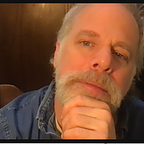Hiding OCD is practice for duplicity
If you hide your obsessive-compulsive disorder, over time you can become a master of deception. I had about fifty years of practice at appearing normal. I worked really hard at it and for the most part I pulled it off. I went to school, got advanced degrees, got married and successfully raised a child. I ran a business. As Midwest musical masters DEVO muse in Mongoloid:
And he wore a hat
And he had a job
And he brought home the bacon
So that no one knew
I’m a vegetarian, so I brought home the tofu. But you get the idea. I thought I had to hide my condition. It was too embarrassing not to. After all, I suffered with OCD for half my life before I was ever diagnosed; I thought I was the only person with these irrational behavioral compulsions.
When you get to be an expert at hiding parts of your life, you become adept at keeping other secrets. I developed a serious and destructive addiction that I kept from my family until it nearly destroyed us.
In the United States, it is now much easier to talk about mental illness than when I was growing up. Seeing a therapist is fairly commonplace. Yes, pockets of American culture still consider mental illness a taboo subject, but by and large people are more open than ever before in discussing their brain conditions. That is why I urge…
